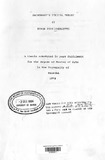| dc.description.abstract | Ethics is the concern of every sane individual and every organised human community.
It is of paramount importance to governments,villages, families, religious organisations and all right thinking people. It is cherished for the sake of social harmony and the maintenance of law and order.However mankind from time immemorial has been bogged down with the problem of which ethical theory to adhere to from so many
contradictory ones. Our Kenyan experience has been no better because of the bombardment of different ethical theories from the Western and Eastern civilizations.
This thesis has focussed its attempts to an exposition and analysis of the MacMurrian
ethical theory. The study advocates the same theory for present day Kenyan society. It also addresses itself to the problem of how the said theory can be transmitted to the youth in particular and to society in general.The introduction starts with a brief
biography of professor John MacMurray and gives the reason for embarking on the study. It also highlights the MacMurrian standpoint or world view of thinking as an agent or a participant unlike the traditional solitary theoretician of dualism. It is a shift from the traditional Cartesian method to the MacMurrian approach.The introduction also gives insights into the theoretical framework and the methodology to be adopted in the thesis.
The second chapter deals with MacMurray's concept of the person. He conceives the person on a three tier basis namely, the material body, the organic life and the personal consciousness. He derives this from his conception of the universe as matter, organic and personality. Out of this three tier conception of the person emerge three levels of morality namely, mechanical, social and personal.The third chapter discusses both the
mechanical and social forms of morality. The mechanical form of morality arises when human beings interact as if they were only material objects. This form of morality is legalistic.Social morality arises when human beings interact as if they were only living organisms.This form of morality encourages individuals to conform to tradition. It is a morality of service to the development or progress of society.MacMurray rejects both of these forms of morality because they are inadequate and inappropriate for humanity. He recommends instead what he has called personal morality.The fourth chapter is on personal morality which arises when human beings interact and value each other as persons. It is a morality which is based on love and is characterised by human freedom and equality. When this form of morality matures, it necessarily leads to religion.
The fifth chapter discusses how personal morality leads to religion which unites not only
human beings among themselves, but also bridges mankind with God, the universal Personality.The sixth chapter is on the moral development of personhood from infancy to maturity.It will also highlight whether ethics should or should not be divorced from religion. As for the methodology of imparting the MacMurrian form of morality to the youth, MacMurray shifts the burden to the educationists to experiment as best as
they can.The seventh and last chapter tries to show some relevance of MacMurray's theory to our Kenyan situation especially with regards to the transmission of morals in the family and society at large. The chapter will, therefore, deal with the methodology to be adopted in transmitting the theory. The method itself is ethical osmosis which
is meant to let moral values permiate gently and gradually into the lives and value systems of the youth and society as a whole. | en |

